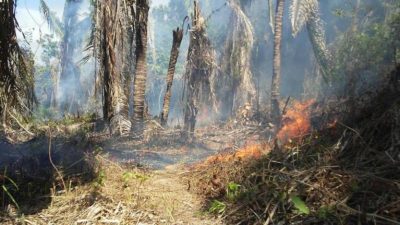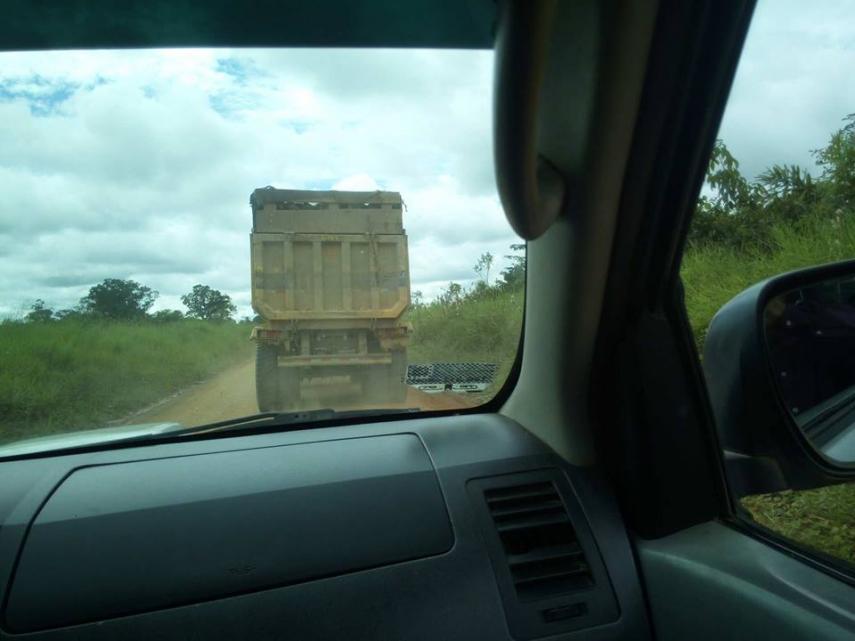“We Are Ready to Kill”: Threats Against the Shipibo Community of Peru’s Amazon Intensify Following Court Order Against Palm Oil Company

Leaders from the Shipibo community of Santa Clara de Uchunya, Peru, have reported a spike in violent threats and intimidation in the weeks following a court injunction against the palm oil company responsible for appropriating and deforesting more than 7,000 hectares of their ancestral territory.
Carlos Hoyos Soria, chief of Santa Clara de Uchunya, reported two separate incidents which occurred during January. On the night of 5 January 2018, two armed and hooded persons arrived at the home of a community elder, whose house lies on the periphery of the village closest to the expanding plantations. They went on to question his daughter-in-law, who was alone at the house, asking whether she was a community member. Concerned for her safety, she denied this. They then showed her a shotgun and told her they were looking for the community leaders and any community members, because “we are ready to kill”.
Subsequently, on the night of 20 January, several hooded figures made an attempted attack against the same household. Hoyos summed up the reality facing families in Santa Clara de Uchunya as “death threats, direct gunshots at point-blank range and constant harassment.”
These incidents come only weeks after land invaders, believed to be associated with the palm oil operations, fired gunshots at a community delegation gathering evidence of the destruction of community forests. As a result, a representative of local indigenous organisation FECONAU, Edinson Mahua, narrowly escaped serious injury.
Hoyos called for action from the local authorities, who continue to fail to ensure the security of the community, citing the fact that although community leaders reported the incident on 11 December to the district prosecutor in Campo Verde, they are still yet to notify the police in Nueva Requena.
Hoyos also denounced corruption in the Regional Government of Ucayali and the Municipal authorities in the District of Nueva Requena, which have been supportive of the expansion of oil palm plantations in the region, and particularly the Regional Department for Agriculture, which instead of titling the community’s ancestral lands, has continued to publicly undermine Santa Clara’s bid for legal recognition of their traditional lands and issue certificates of possession to individuals whom the community claim have installed themselves in the area under the guise of rice cultivation to engage in land trafficking.
Hoyos remarked in a recorded testimony,
“It pains me to see how with each passing day, the community continues to face death threats and other threatening behaviours from land-traffickers, on whose account we continue to suffer constant harassment, day and night, by hooded persons who cause alarm, fear and terror in the community. We are a peaceful people; we do not want to become victims of these people, who claim to be rice growers, but who are in fact land traffickers.”

Business as usual, in spite of the recent court injunction: palm fruits are trucked away for processing. (Source: Carlos Hoyos Soria)
These latest threats come a matter of weeks after an injunction was issued by the Fourth National Court for Preparatory Investigations in Lima, ordering the immediate suspension of all logging and deforestation by the palm oil company operating in Santa Clara de Uchunya’s territory, Plantaciones de Pucallpa SAC, now known as Ocho Sur P SAC. On the one hand, the community welcomes this court decision, which reaffirms a September 2015 resolution from the Ministry of Agriculture, declaring that the company had engaged in illegal deforestation and ordering the suspension of operations. However, Hoyos also expressed his concern that the recent injunction “missed its target”, as Ocho Sur P SAC continues to operate, dispatching palm fruit from the plantation by the truckload for further processing.
Amidst this context of escalating aggression by land traffickers and neglect by local authorities to recognise and secure the land rights of the community, desist from promoting their lands to agribusiness operations and settlers, as well as provide effective protection to community members and leaders, Hoyos reiterated the community’s call for the intervention of central government and international human rights agencies, after formal appeals were made to the UN Special Rapporteurs on Human Rights Defenders and Indigenous Peoples in October and December 2017. Such interventions, he said, are vital in order to avoid further violence towards his community and deliver a peaceful solution to this problem which has been afflicting his people and their territory for years.

